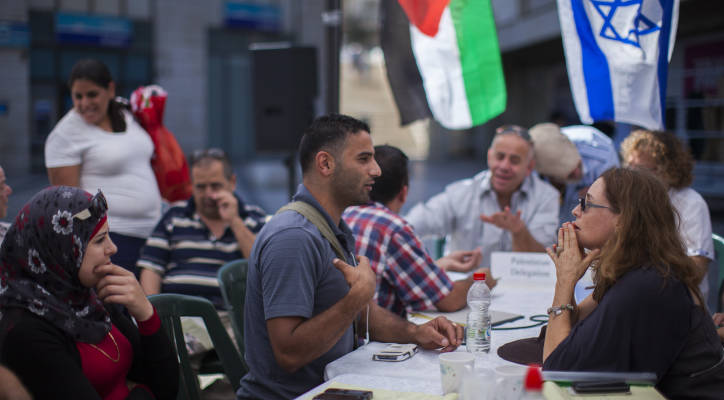A new poll published by the Israel Democracy Institute and the Palestinian Center for Policy and Survey Research shows simultaneously how much – and how little – Israelis and Palestinians agree with each other, depending on the issue.
A slight, yet diminishing, majority of Israelis (58.5%) and Palestinians (51%) still support the two-state solution, although they do not trust each other, have disparate views on the terms of a permanent agreement, underestimate the level of compromise on the other side, and view its intentions as threatening, this according to a new poll conducted by the Israel Democracy Institute and the Palestinian Center for Policy and Survey Research (PSR) and published on Monday.
A quarter of those opposed to a permanent settlement said they are likely to change their opinion with the right political setting.
Large majorities of Israelis and Palestinians estimate as low the chances that an independent Palestinian state will be established in the next five years.
When asked about their readiness for mutual recognition of national identity of their respective states as part of final status agreement, a majority (64%) of Israelis and a minority (43%) of Palestinians support mutual recognition.
Who should broker a peace agreement? Palestinians (44%) prefer a multilateral negotiations process. Israelis (40%) prefer bilateral negotiations.
If posed with multinational negotiations, both Israelis (28%) and Palestinians (22%) would prefer support from an Arab forum (Saudi Arabia, Egypt and Jordan). All other multilateral forums – American-led (Israelis 26%, Palestinians 8%), EU-led (Israelis 7%, Palestinians 20%), or UN-led (Israelis 12%, Palestinians 22%) – are acceptable to one side while unacceptable to the other.
A majority (68%) of Palestinians look up to Israeli democracy, seeing it as “good” or “very good,” while only 10% of Israelis see Palestinian democracy positively, with 77% describing it as “bad” or “very bad.”
When asked about the chances that a better democratic system will be established in a future Palestinian state, the majority of Israelis (83%) say the chances are “slim” or “very slim.”
Mutual Mistrust and Fear
The poll found that 89 percent of Palestinians feel Israeli Jews are untrustworthy, while 68 percent of Israeli Jews held similar opinions toward the Palestinians.
It also found that 65 percent of Israelis fear Palestinians. In contrast, just 45 percent of Palestinians fear Israelis.
Tamar Hermann, an Israeli political scientist who conducted the survey with Palestinian pollster Khalil Shikaki, said that under the current circumstances the results were “not amazingly encouraging,” but also “not discouraging.”
“It showed there is still some basis for optimism with the right leadership,” she asserted. “Right now I don’t see on the horizon a leader on either side willing or capable of using this as a springboard for intensifying the negotiations. But it’s not impossible.”
The poll, which surveyed 1,270 Palestinians and 1,184 Israelis, focused on the public’s views on a permanent peace agreement, ability to trust and compromise with the other side, and mistrust and fear of the other.
By: Max Gelber, United with Israel
AP contributed to this report.
